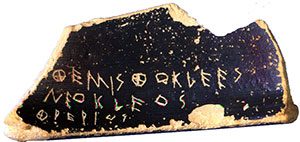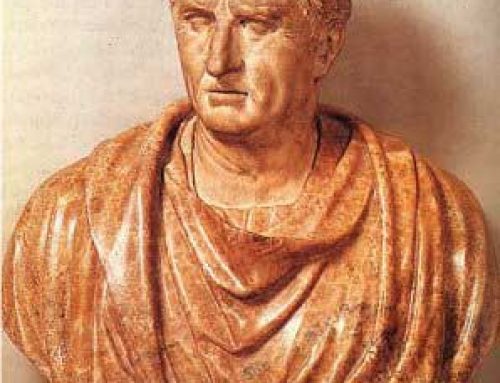
History of Democracy: The Pnyx, where Athenian men debated issues and voted
What is democracy?
Democracy means the rule of the people (in Greek). That is where each individual person has a vote about what to do. Whatever the most people vote for wins. There is no king or tyrant, and anybody can propose a new law.
What is a tyrant?
What is a king?
More Greek government
All our ancient Greece articles
Who gets to vote?
One problem that immediately comes up in a democracy is who is going to be able to vote. Should people vote who are just visiting from some other city-state? What about women? Poor people? Enslaved people? People in jail? How about little kids, should they vote? Or should there be some limits? How will the democracy keep the majority from oppressing minorities – what will protect smaller groups?
What is a city-state?
Women in ancient Greece
Ancient Greek slavery
History of democracy: Athens, Greece

History of democracy: Potsherd used to vote for Themistocles (can you see his name written on it?)
The earliest democracy in the world began with the work of a man named Cleisthenes, in Athens, in 510 BC.
Cleisthenes and Athens
In Athens, the government let all the free adult men who were citizens vote, rich or poor. That was great for poor men – as long as they weren’t slaves – but bad for women, who were pretty much shut out of the political power they had had in the Archaic period.
Archaic Athens
How about Corinth?
Democracy in Thebes
But not in Sparta
When democracy turned out to work in Athens, many other city-states chose it for their government too. But most of them allowed even fewer people to vote than Athens did: most of the other city-states only allowed free adult male citizens to vote IF they owned land or owned their own houses (that is, the richer people). They didn’t let women vote either.
The Council of 500: choosing by lottery
One big problem for democracies was that it was very inconvenient for men to always be going to the meeting-place to vote. Most men had work to do, planting their grain, making shoes, fighting wars or whatever. They couldn’t be always debating and voting.
Plowing and planting
History of leather
Mercenary soldiers
So most democracies sooner or later ended up choosing a few men who would do most of the voting, and the rest only came when there was a really important vote. It was hard to decide how to choose these few men, and different cultures did it different ways. Athens did it by a lottery. If you got the winning ticket then you were on the Council of 500. Men served for a year (and women couldn’t serve at all).
Democracy spread around the Mediterranean Sea, but it was pretty much wiped out by the Roman Empire about 100 BC. Still, places like Athens continued to use democratic methods to make their own decisions on local matters for a long time after that.
History of democracy: Northern Italy
A thousand years later, in the Middle Ages, some cities in Italy – Siena, Florence, Genoa, Pisa, Venice – went back to having a democratic government after Matilda of Canossa died.
Matilda of Canossa
Republic of Florence
The port of Genoa
Late medieval Venice
These democracies were all organized in slightly different ways, but none of them allowed the poor, women, or children to vote, and some had a lottery system like Athens. Further north in England, some men got the right to vote for local officials and for their representative in Parliament in the Middle Ages, but the king still held most of the power.
What is the Magna Carta?
King John and the Magna Carta

History of democracy: Women voting in their first United States election (1920)
These Italian democracies, too, were eventually conquered by the Holy Roman Empire and ruled by German emperors.
American and African councils
Meanwhile in North America and in Africa, many people had organized themselves in towns and villages where the leader had no power to force anyone to do anything. Leaders could suggest building a wall or fighting a war, but people chose themselves whether they wanted to work or fight.
Early Mandan
The Guarani
The Khoikhoi and the San
History of democracy: Britain, France, and the United States
In the 1600s, Europeans saw more of these American and African people. They didn’t have to do what the king said. Soon Europeans started to fight for democracy again. In England, Cromwell seized power for Parliament. Thomas Paine and Mary Wollstonecraft wrote about human rights.
Cromwell and Britain
Thomas Paine
Mary Wollstonecraft
American Revolution
French Revolution
In America, the Revolutionary War brought the Constitution in 1789, which let free adult men vote if they owned their own farm or business. A few years later, the French Revolution brought democracy to France (for a short time).
More people get power
These early modern democracies only let rich men vote – not women, or children, or enslaved people, or colonized people. But slowly more people started to fight for their right to vote and hold office. In the early 1800s, poor white men got the vote. Then slowly in the later 1800s enslaved people broke free in the United States and Brazil. In Austria-Hungary and Russia, the serfs won their freedom too. By the early 1900s, women were getting the right to vote. In 1964, the Civil Rights Act pushed the United States forward. And in 1971, 18 year olds got the right to vote in the United States.
Equal rights for some
Constitutional Amendments
Austria-Hungary in the 1800s
Russia under the last Czars
Civil Rights Movement
Democracy today
Today many countries are democracies, and in most of them poor people, people of color, and women have now won the right to vote, though children and foreigners still can’t. Some places are experimenting with letting 16 year old people vote. The amount of power available to voters, however, still varies widely from country to country, and many countries, like Saudi Arabia, are still not democratic at all.
Did you find out what you wanted to know about the history of democracy? Let us know in the comments!





*yawn*
Thank you for this interesting article. I was recently looking into the rise of the Nazi party and politics in the early 20th century. It seems that a lot of people, whether educated and powerful or not, opposed the idea of democracy outright. What was the mindset at that time? What were the alternatives that seemed better and why? Why would anyone other than the current rulers oppose democracy?
There were a lot of reasons. People often think it will be more efficient to have one person in charge. Democracies can be frustrating if there’s a lot of compromising, or a lot of fighting so nothing seems to be getting done. Also, a minority may fear a democracy if it means that the majority will push them around. Or they may feel like the democracy has been taken over by rich people, and the one ruler will care more about ordinary people. Hitler hit a lot of these buttons. He said he cared about ordinary people. He said he would look out for “real Germans” against large populations of immigrant (and German) Jewish people. He told people they were poor because rich people had conspired to make them poor.
Thank you for the article. I was reading 2 Chronicles where it overviews the reign of 20 different kings and it made me curious about the first democracy.
I’m glad we could help!
“people of color”, This is America differentiating between it’s peoples.
This is me, reminding people that slavery happened, and Jim Crow, so that black and Native people were prevented from voting for a long time. Even today, white people are still trying to make it hard for people of color to vote.
im bored
That’s too bad, Kaylie! What were you trying to find out?
this doesn’t say who invented it
I’ve changed the article to make that more clear; I hope that helps, Charles!
Can we truly say democracy then hasn’t changed much or has improved the well being of half the nation practising.Why do powerful nation want to impose their type of democracy on other’s Even as such countries feels satisfied with it.
Well, that’s a bunch of different questions, Abdul. First, the United States government wants to force other countries under its control, and calling that imperialism “democracy” is a way to dress it up in prettier words. Second, though, countries get richer and more powerful by having a strong middle class, and generally you can’t have a strong middle class for long before they start to want political power – and that’s a democracy. So prosperity and democracy go hand in hand, even if what the United States is pushing isn’t really democracy.
Maybe you should have more about how Greece set up colonies.
You’ll find out more about Greek colonies here: https://quatr.us/history/archaic-greek-history.htm
Thank you. Just that I wanted to develop an article about democracy in Nigeria. I also need a guide.
Thanks for the explanations but I still want to know who invented the concept of democracy. The history I’ve read so far only points out where it started from but never really explained who started it and what informed the idea.
That’s an excellent question, Nelson, and it does have an answer. Greek armies started to fight using hoplite tactics, where the men stood in a line with their shields overlapping and acted as a unit (a phalanx). The hoplite phalanx required a lot of training to be successful, but cities that used it won their battles. Men who were fighting as hoplite soldiers saw that every man was important, not just the leaders, and demanded political rights that took their ideas into account. You can read more about it here: https://quatr.us/greeks/greek-hoplite-war-ancient-greece-htm.htm and here: https://quatr.us/greeks/greek-hoplites-democracy.htm
A similar thing happened at the same time in Rome and in Carthage, probably for the same reason – all three places were using the hoplite phalanx.
But feel free to ask again if this doesn’t help.
You probably also want to read about Cleisthenes though: https://quatr.us/greeks/democracy-classical-athens.htm – Cleisthenes wanted power for himself, but he saw the way the hoplite phalanx was making Athenian men feel. So he found a way to use that feeling to get power for himself by inventing the democracy.